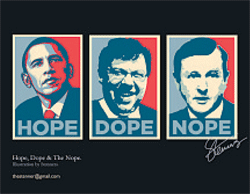Getting real in present downturn |
| Findings from a McCann Erickson survey of 1,000 consumers interviewed online |
Most consumers blame the Irish government and the country's major banks for the current economic crisis and there is a general consensus that by becoming more materialistic and less prudent during the good times we are now paying the price.
A survey of 1,000 online consumers by McCann Erickson showed that 67 per cent of the respondents felt that Irish people had lost their “unique sense of identity”. The downturn resulted in people “losing the run of themselves” and they now had a need to re-state their priorities, Leo Moore, the agency's strategic planning director, said.
After evaluating their priorities, 88 per cent said themselves and their families was the top priority, while 87 per cent said good health was important. Only 41 per cent mentioned being successful at work as being a major aspiration.
The study found that 69 per cent of respondents felt experiences take precedence over possessions and the mood has changed from one of expectation to caution, with 60 per cent now believing Ireland is a worse place to live than it was a year ago. Rising food and fuel prices are major worries.
As the people who are the main ‘gate keepers' of the house, women are far more concerned than men about the cost of living, the economy, food and fuel prices. They are fighting on the front line and are aware that they are going to have to become more pragmatic and astute about household finances.
Moore said the messaging that appeals to women in these circumstances is different than that which appeals to men – reassurance versus technical detail. Brands will need to ensure that the tone of their communication reflects this.
While consumers believe the future of the Irish economy is bleak, when it comes to their own personal circumstances, people are more upbeat with 69 per cent being positive in their own personal financial situation, remaining confident that they would keep their job and also their ability to maintain their current lifestyle. It indicates that the true impact will only be realised when consumers start to lose their jobs or experience negative equity for themselves.
“Our role in business is creating demand for brands and in the current turbulent environment we must understand key consumer needs and motivations and use these insights to unlock demand. The implications of this study provide sign-posts to highlight where brands can concentrate their communications and to optimise their investment in tougher economic times,'' Moore added.
Despite economic concerns, the environment remains a concern, with 44 per cent admitting they thought about the effect of our carbon footprint. Another 50 per cent said they were ‘somewhat concerned' and 32 per cent believe that buying environmentally friendly products is more of a priority than ever.
Consumers are becoming wiser and smarter when it comes to their pockets. It was found that 91 per cent of consumers always check the prices before buying anything, while 94 per cent shop around to get the best prices.
Most consumers are now willing to switch brands to save money, 63 per cent regard a household budget as a priority and 35 per cent of people now believe that saving is now more of a priority for them than it was last year.
Moore said brands must ensure that they grab the opportunities presented by the downturn. “We're in the middle of a cultural shift away from greed,” he said. “Consumers are glad to see us a return to normal values. Brands can trade on their down-to-earth credentials and be more real.”
As consumers stay in more, take away foods, premium private label foods and off-licences will become more important to consumers as they look to trade down rather than give up completely on their favourite indulgences. Brands that add value and build communication around this have an advantage.
In a previous consumer survey carried out earlier this year by McCann, simple things like packaging cheaper own label brands in packaging that looks like it is for people on the breadline does not work and makes people feel worse.
A financial health check will involve us putting everything from our house insurance to our mobile phone provider under scrutiny. The public have given the banking sector a vote of ‘no confidence' and banks and financial companies must re-establish damaged relationships with consumers.
Politically, the government and opposition parties must ensure their messaging is clear. Strategies on the health service and budget decisions created a perception that the government is to blame for the current crisis and ‘not in touch' with consumers. Political parties have to convince consumers they know what to do and must communicate it more clearly.
 |
TAKING A STANDAn illustration by Stenners (http://sites.google.com/site/thestenner/) points to the present mood about leadership prospects in the US and closer to home. In an online survey of 1,000 consumers, McCann Erickson found that the Irish government and opposition parties need to perform better. |









